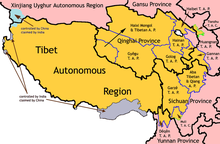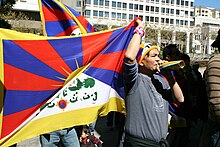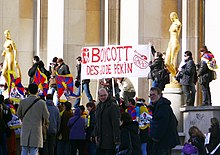Tibetan Riots 2008
The Tibetan unrest began in March 2008 with initially non-violent demonstrations by Buddhist monks in Lhasa . Requests were made for the 14th Dalai Lama Tendzin Gyatsho to return from exile and for Tibet to be independent from the People's Republic of China . A few days after the first protests, violent clashes began in Lhasa, mainly by younger Tibetans , and then in other parts of the country, both against Chinese civilians and against the state authorities and their institutions.
course
The protests began on March 10, 2008, the 49th anniversary of the 1959 Tibetan uprising that resulted in the Dalai Lama's flight to India . It started with non-violent demonstrations by the monks of the Sera monastery on the outskirts of Lhasa , who demanded the return of the Dalai Lama and the independence of Tibet . For the time being, the Chinese authorities tolerated these protests.
On March 14, riots began in Lhasa’s old town, which is mainly inhabited by Tibetans and surrounding the Jokhang Temple, and was primarily directed against Han Chinese whose shops and vehicles were looted and set on fire. The long-established Muslim minority, with whom there has been a simmering conflict for several years, was also attacked. Mosques, among others, were burned down in Lhasa and Xiahe . According to the Chinese authorities, several people were seriously injured and 13 killed in the attacks. Most of the fatalities are said to be Chinese civilians who were murdered by angry Tibetans. As the day progressed, the unrest spread to other parts of the city. A large number of Chinese security forces arrived in Lhasa on the same day . The three largest monasteries in and around Lhasa ( Drepung , Ganden and Sera ) were cordoned off. Eyewitnesses report attacks on the police, fire brigade and paramedics. Police forces also used tear gas and shot in the air, according to Radio Free Asia, two people are said to have died. Tourists and aid workers have been ordered to leave Tibet. Chinese security forces patrolled the streets of Lhasa.
Many Tibetans, including many monks demonstrated on March 16, 2008 in Ngawa (Autonomous District Ngawa , Province of Sichuan ). Chinese security forces then reportedly used tear gas, surrounded a monastery and shot at least eight people. On March 20, the official Xinhua news agency reported , citing police sources, that four demonstrators were shot injured during the operation. According to circles in exile, up to 300 Tibetans marched to government buildings with pictures of the Dalai Lama in the autonomous district of Karchu and in Sangchu in the Gansu province . In the city of Lanzhou , 100 Tibetan students took part in a sit-in strike at the local university. According to eyewitnesses, people are also said to have died in the neighboring provinces of Sichuan, Gansu and Qinghai , especially Tibetan monks who demonstrated there. According to information from the Tibetan government in exile , at least 80 people died.
The Dalai Lama expressed concern about the reports and called on both sides to renounce violence. If the violence by the Tibetan side does not stop, he threatened on March 18 that he would resign as political leader of the Tibetans in exile and head of the government in exile.
Reactions within China
An international investigation into the incidents is rejected by the Chinese government. A spokesman for the Foreign Ministry in Beijing also rejected the request for an independent envoy from the United Nations as interference in China's “internal affairs”. At the same time, he accused the Dalai Lama of having contributed to instigating the unrest and of misleading the international public with "a lot of lies"; its calls for peace are withheld from the Chinese public. Before the National People's Congress , the Chinese Prime Minister Wen Jiabao defended the actions of the security forces against demonstrators and blamed the supporters of the Dalai Lama for the unrest, which resulted in death and serious damage. He also accused the Tibetan autonomy movement of deliberately thwarting the 2008 Olympic Games through the conflict .
Arrest warrants have been issued against 21 people allegedly involved in the unrest since March 17. Photos of the suspects have also been posted on Sina.com and Yahoo's Chinese portal .
On March 19, 2008, Zhang Qingli , the secretary of the Chinese Communist Party in Tibet, tightened the tone of the dispute and spoke of a "life and death fight with the Dalai Lama's clique," which required tougher political controls in the autonomous regions . The last foreign journalists to be expelled from Tibet on March 20th were Georg Blume (correspondent for taz and ZEIT ) and Kristin Kupfer (correspondent for profil ). When 26 foreign journalists were allowed to return to Lhasa in a guided group on March 27, several monks interrupted a Chinese government official's speech and demonstrated against Chinese politics and for the spiritual leader of the Tibetans, the Dalai Lama.
On March 23, 2008, critical voices within China against the behavior of the government were first known. In a manifest on the Internet, 29 university lecturers, authors, lawyers and civil rights activists put forward "Twelve Proposals on the Situation in Tibet".
On April 25, the Chinese government surprisingly agreed to receive a representative of the Dalai Lama for talks.
Blocking of YouTube
On March 16, 2008, access to the Internet video portal YouTube was blocked in parts of the People's Republic of China . According to Focus , this happened after "dozens of films about the protests in Tibet appeared there". The Süddeutsche Zeitung commented: "What is currently going on in Tibet should not be seen unfiltered in China." YouTube was blocked in October 2007 . Foreign websites are usually blocked immediately in China if they distribute content that is critical of the government.
Reactions outside of China
On March 10, 2008, Remembrance Day demonstrations were also held in cities outside of China. Protests in Kathmandu of probably around 3,000 demonstrators were violently broken up by the Nepalese authorities, and several dozen demonstrators were arrested. In India, a six-month march with around 100 Tibetans in exile was supposed to lead from Dharamsala to Tibet, but this march was stopped after a few kilometers by the Indian police and several people were arrested.
Protests by Tibetans in exile occurred worldwide in front of diplomatic missions of the People's Republic of China, for example in Washington, DC , Sydney and Copenhagen . In Zurich there were occasional stones thrown at the Chinese consulate. In Melbourne , the protests in front of the Chinese consulate were violently broken up by the police. The embassy in Paris was stormed. The police used tear gas. Around 30 demonstrators attacked the Chinese consulate general in Munich . Several employees of the consulate were slightly injured. The demonstrators burned the Chinese national flag and sprayed the building with slogans such as “Save Tibet” or “Stop Killing” and “Stop the Murder”. The police temporarily arrested 26 people, including attacks on the police. The demonstrators face charges of trespassing , trespassing and bodily harm . The Tibet Initiative Munich then called for non-violence: "We at the Tibet Initiative Munich understand the feelings of the Tibetan refugees, but demand to refrain from crossing borders and to obey the Dalai Lama's call for non-violence." During a solidarity rally for Tibet In front of the Chinese embassy in Berlin on March 20, 2008, a Tibetan set himself on fire in protest against the Chinese policy on Tibet. He was rescued by passers-by and suffered only minor injuries. In Vienna , a protester climbed up the Chinese embassy, tore down the Chinese flag and held up the Tibetan flag. He was then dragged in from the embassy by Chinese. Before being handed over to the Vienna police, he is said to have been mistreated in the embassy, which the embassy denies.
The Foreign Minister of the United States , Condoleezza Rice , called on the Chinese government to show in dealing with the protests restraint and appealed to the demonstrators to desist from violence. The German Chancellor Angela Merkel declared on March 14, 2008: “The Federal Government has always supported the Tibetans' claim to religious and cultural autonomy.” At the same time, however, she opposed all separatist efforts.
Amnesty International called for the violence to stop and an independent investigation by the United Nations .
Discussion about Olympic boycott
Worldwide the reports on the situation in Tibet led to a discussion about a possible boycott of the 2008 Olympic Games in Beijing . Tibetans demonstrated in front of the building of the International Olympic Committee in Lausanne. Nevertheless, the Dalai Lama, the International Olympic Committee, the German Chancellor Merkel and the sports ministers of the European Union spoke out against an Olympic boycott.
On March 22, 2008, EU Parliament President Hans-Gert Pöttering ( CDU ) was the first high-ranking politician to threaten with an Olympic boycott: “Beijing must make a decision. It should negotiate with the Dalai Lama immediately. If there are no signs of understanding, I consider boycott measures to be justified. ”As early as March 18, the General Secretary of the Society for Threatened Peoples, Tilman Zülch, suggested that German politicians should boycott the opening ceremony. The chairman of the Bundestag Sports Committee , Peter Danckert ( SPD ), and the General Director of the German Olympic Sports Confederation (DOSB), Michael Vesper , continued to reject boycott measures. The Olympic Games “cannot serve as a bargaining chip for politics,” said Vesper.
On March 30th in Brdo , Slovenia , the EU decided to jointly speak out against a boycott of the Olympic Games, even though members had different attitudes. Among other things, the French President Nicolas Sarkozy did not rule out a boycott.
An incident occurred during the torchlight ceremony: three pro-Tibet activists dressed in black delayed the lighting of the Olympic flame with shouts and black flags . Another incident occurred during the torch relay in Paris on the afternoon of April 7th. The torch went out on the sidelines of anti-Chinese demonstrations. It was partly transported by bus, since further use of runners could have turned into a farce.
literature
- Materials on the March 14, 2008 riots in Lhasa [ Xīzàng “3 • 14” shìjiàn yǒuguān zīliào «西藏“ 3 • 14 ”事件 有关 资料»], Foreign Language Literature Publishing House, Beijing 2008; Volume I ISBN 978-7-119-05205-2 , Volume II ISBN 978-7-119-05220-5 , Volume III ISBN 978-7-119-05225-0 , Volume IV ISBN 978-7-119-05231- 1 .
- Quo vadis Tibet? The riots in Tibet and China's search for a 'harmonious society', in: das neue China , 35th vol. No. 2 (June 2008), pp. 23–30.
Web links
- China's problem with Tibet ( memento of March 24, 2008 in the Internet Archive ), article dossier of the Neue Zürcher Zeitung
- Unrest in Tibet , dossier of the times (with further reports from Blume and Kupfer)
- Tibet Uprising 2008 , Spiegel Online dossier
- Tension in Tibet , BBC News special
- Andreas Gruschke: Tibet. The Dalai Lama's lobby , comments on the "aftermath" of the unrest in Eurasian Magazine
Individual evidence
- ↑ a b profile (edition 13/2008): When anger came to Tibet ( Memento from November 25, 2012 in the Internet Archive ), March 21, 2008
-
↑ Die Zeit : Fear of Repression , March 17, 2008
FAZ : China and Tibetan Culture: Museum of Hate , March 18, 2008
The Economist : Tibet: Fire on the roof of the world , March 14, 2008
NZZ : Unrest in Lhasa claim numerous dead , March 16, 2008 - ↑ Nina Ritter: Muslims as a third party in the Tibet conflict NZZ article from March 26, 2008
- ↑ a b tagesschau.de : "Everywhere Tibetans live there are riots" (tagesschau.de archive), March 17th, 2008 (with pictures and video interview with ARD correspondent Jochen Grabert)
- ^ The Economist : Tibet: Fire on the roof of the world , March 14, 2008
-
↑ Spiegel Online : China-Tibet Crisis: Dead in riot in Lhasa - Dalai Lama worried , March 14, 2008
Stern : Protest of the monks: New unrest in Lhasa , March 15, 2008 (with video)
Die Welt : Lhasa: Protests First casualties claim in Tibet , March 14, 2008
Die Zeit : Fear of repression , March 17, 2008 - ↑ Meetings are nipped in the bud ( Memento from July 1, 2015 in the web archive archive.today )
- ↑ Stern : Protest of the Monks: New Unrest in Lhasa , March 15, 2008 (with video)
-
↑ Amnesty International : UN scrutiny of Tibet crisis required , March 17, 2008
Spiegel Online : Violence in Tibet: Dalai Lama threatens to resign , March 18, 2008 - ^ Spiegel Online : Violence in Tibet: Dalai Lama threatens to resign , March 18, 2008
- ^ Frankfurter Rundschau : United Nations: Ban demands restraint from China , March 17, 2008
- ↑ tagesschau.de : Unrest in Tibet: “The Dalai Lama clique is to blame” (tagesschau.de archive), March 18, 2008
- ↑ Xinhua : Internet portals carry images of wanted Lhasa riot suspects , March 20, 2008
- ↑ Spiegel Online : Protests in Tibet: China threatens life and death , March 19, 2008
-
↑ die tageszeitung : Consequences of the uprising in Tibet: taz reporters from Tibet expelled , March 20, 2008
Die Zeit : Report from Tibet: Georg Blume: "Much is lost" , March 20, 2008 - ↑ tagesschau.de : Monks protest in front of foreign journalists (tagesschau.de archive), March 27, 2008
- ↑ New Century News: 关于 处理 西藏 局势 的 十二点 意见 , March 22, 2008; Translation in Die Welt : Courageous Manifesto: Chinese Intellectuals for New Tibet Policy , March 23, 2008
- ↑ FAZ.net: Beijing is looking for contact with the Dalai Lama again April 25, 2008
-
^ Spiegel Online : Tibet Revolte: China blocks YouTube , March 16, 2008.
heise online : China blocks YouTube after the protests in Tibet , March 17, 2008. - ↑ Focus : China blocks YouTube website , March 16, 2008.
- ^ Süddeutsche Zeitung : China blocks YouTube because of Tibet videos , March 16, 2008.
- ↑ InfoWorld: YouTube blocked in China; Flickr, blogspot restored ( memento of January 24, 2008 in the Internet Archive ), October 18, 2007 (English).
-
↑ Spiegel Online : Tibet Revolt: China blocks YouTube , March 16, 2008.
Focus : China blocks YouTube website , March 16, 2008.
Süddeutsche Zeitung : China blocks YouTube because of Tibet videos , March 16, 2008. - ↑ Die Zeit : Protest: Dalai Lama laments the oppression of Tibet , March 10, 2008
- ↑ AFP : Dalai Lama accuses China of human rights violations ( memento of March 19, 2008 in the Internet Archive ), March 10, 2008
- ↑ SF Tagesschau : Tibetans protest in front of the consulate , March 18, 2008
-
↑ AP : Protests in front of the Chinese embassy in Paris , March 16, 2008 Stern : Tibet protest: Tibetans riot in Munich ( memento from February 17, 2013 in the web archive archive.today ), March 17, 2008 Süddeutsche Zeitung : Tibetans arrested in Munich - Spontaneous action in front of the Chinese Consulate General , March 17, 2008
- ↑ Spiegel Online : Berlin: Man set fire to himself at a vigil for Tibet , March 20, 2008
- ^ Wiener Zeitung : Allegations against the Chinese Embassy in Vienna , March 21, 2008 (accessed on November 7, 2013)
- ↑ Der Tagesspiegel : UN should intervene - protests intensify , March 16, 2008.
- ↑ Reuters : Unrest in Tibet - Merkel rejects Olympic boycott , March 17, 2008
- ↑ Amnesty International Germany : Protests in Tibet - Amnesty International calls for an end to violence and an independent investigation by the United Nations , March 20, 2008
- ↑ Spiegel Online : China in Twilight: Tibet Crisis Heats Debate about Olympic Boycott , March 17, 2008
- ^ SF Tagesschau : New protests in Tibet claim dead, also demo in front of IOC building in Lausanne , March 18, 2008
-
↑ n-tv : Olympic Games - Government Against Boycott , March 17, 2008
EuroNews : Dalai Lama continues against Olympic boycott , March 17, 2008 - ↑ China's media counter-offensive
- ^ Süddeutsche Zeitung : Conflict over the situation in Tibet - "Boycotting the Olympic opening" , March 18, 2008
- ↑ Die Zeit : Bloody unrest in Tibet: Call for Olympic boycott grows louder , March 22, 2008
- ↑ Reuters : EU renounces threat of Olympic boycott against China , March 30, 2008
- ^ Spiegel Online : Greece: Olympic flame ignited - demonstrators disrupt the ceremony , March 24, 2008
- ↑ Christof Siemes: Olympia 2008: The fire runs out of air. In: Zeit Online. April 8, 2008, accessed April 7, 2008 .



